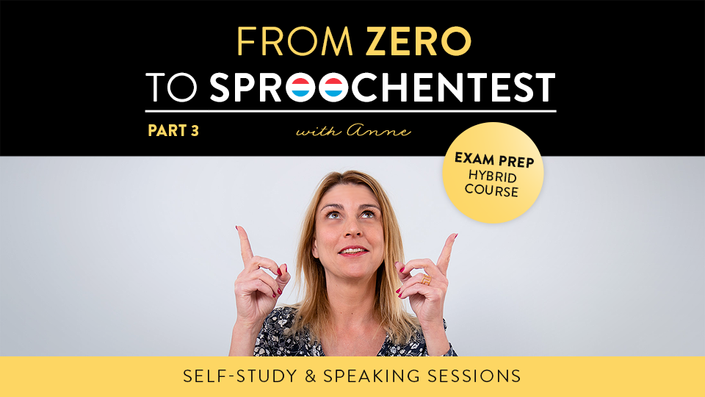This lesson is all about remembering the verbs which require the helping verb “sinn” to build the perfect tense in Luxembourgish.
Verben mat SINN
The verbs expressing a change of state:
erwächen – to wake up
Beispill – example
Ech sinn haut de Moien um 6 Auer erwächt. – I woke up at 6am this morning.
opstoen – to get up
Beispill – example
An der Vakanz sinn d’Kanner um 10 Auer opgestanen. – The children got up at 10 o’clock on vacation.
aschlofen – to fall asleep
Beispill – example
Ech si gëschter spéit ageschlof. – I fell asleep late yesterday.
wuessen – to grow
Beispill – example
Meng Duechter ass dëst Joer vill gewuess. – My daughter has grown a lot this year.
stierwen – to die
Beispill – example
Eisen Hond ass d’lescht Joer gestuerwen. – Our dog died last year.
Verbs expressing a movement from A to B
klammen – to climb / to increase
Beispill – example
D’Bouwe sinn iwwer d’Mauer geklommen. – The boys climbed over the wall.
fléien – to fly
Beispill – example
Meng Eltere sinn de Moien a Japan geflunn. – My parents flew to Japan this morning.
reesen – to travel
Beispill – example
Wéi ech jonk war, sinn ech vill gereest. – When I was young, I travelled a lot.
fueren – to drive / to go
Beispill – example
Mir si mam Zuch op Paräis gefuer. – We went to Paris by train.
goen – to go
Beispill – example
Ech si mat enger Frëndin an d’Schwämm gaang. – I went with a friend to the swimming pool.
reiden – to ride a horse
Beispill – example
Meng Duechter ass gëschter 3 Stonne geridden. – My daughter has ridden for 3 hours yesterday.
schwammen – to swim
Beispill – example
Ech sinn nach ni am Séi geschwommen. – I have never swum in the lake.
kommen – to come
Beispill – example
Ech sinn ze spéit an d’Reunioun komm. – I came too late to the meeting.
falen – to fall
Beispill – example
Hënt ass vill Schnéi gefall. – Much snow has fallen last night.
lafen – to run
Beispill – example
Ech sinn de Moien zéng Kilometer gelaf. – I ran 10 kilometers this morning.
sprangen – to jump
Beispill – example
D’Kanner si vu Freed an d’Luucht gesprongen. – The children jumped for joy.
plënneren – to move
Beispill – example
Eis Nopere sinn endlech geplënnert. – Our neighbours finally moved.
Others
bleiwen – to stay
Beispill – example
Mir sinn de ganze Weekend doheem bliwwen. – We stayed the whole weekend at home.
ginn – to become
Beispill – example
Mäi Jong ass gëschter 15 Joer al ginn. – My son became 15 years yesterday.
geschéien – to happen
Beispill – example
Wat ass dir da geschitt? – What happened to you?
These are 20 verbs only (not complete). From these even more verbs can be derived with the help of prefixes, e.g. as „goen“.
Its derivates with the prefixes eran-, eraus-, erop-, erof-, mat-, duerch-, ëm-, vir-, zer-, ent- iwwer-, use sinn as well.
Watch this lesson and all previous lessons on my Youtube channel!
Do you have level A2 and you want to be best prepared to take the Sprooochentest?
Then this hybrid course is all what you need to succeed:





